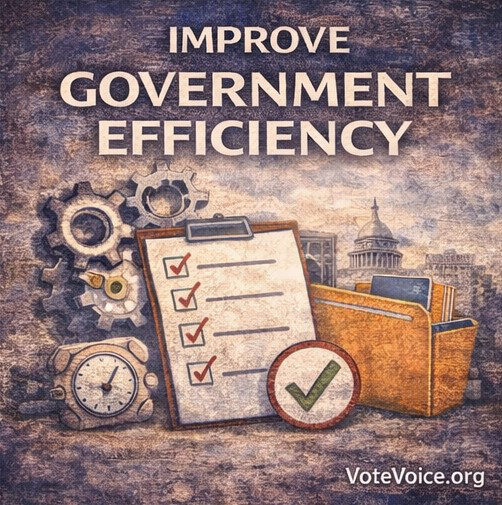Government Efficiency

Key Concerns:
- High administrative costs reduce funds available for public services
- Inefficient government slows economic growth
- Waste and mismanagement erode public trust
- Inefficiency exacerbates fiscal stress
- Effective governance strengthens policy implementation
Introduction:
Let’s be honest: when our government wastes money, that’s YOUR money going down the drain.
The solution is not to take a chainsaw to the federal workforce but rather to take a zero-based approach to address existing waste.
High administrative costs mean fewer dollars available for actual public services. When bureaucracy moves slowly, the entire economy feels the drag. And when Americans see waste and mismanagement, they lose trust in the very institutions that are supposed to serve them.
This isn’t just about saving money, though that matters. It’s about whether the government can actually deliver on its promises. Can it process disaster relief quickly when your community needs it? Can it respond to cybersecurity threats? Can it modernize infrastructure or help veterans get the benefits they’ve earned?
Right now, inefficiency is creating fiscal stress, weakening policy implementation, and frankly, making all of us question whether government can work at all.
There is plenty of opportunity to improve our government without decimating the federal workforce.
With recent upheaval in the federal government, we have a rare opportunity. A chance to build something better, not just restore the former status quo. Something that actually works for the American people.
Below is Project RAD’s plan for Addressing Presidential Integrity & Accountability
📘Modernize Federal Technology and Data Infrastructure
🎯 Objective:
Upgrade outdated systems and unify federal IT platforms to improve service delivery, cybersecurity, and decision-making.
✅ Key Actions:
-
Support the Federal Digital Services Corps to deploy technologists across agencies.
-
Mandate interoperable data standards across departments.
-
Audit and retire legacy systems that are redundant, insecure, or outdated.
-
Expand the use of AI and data analytics for fraud detection, benefit verification, and regulatory analysis.
-
Fund the U.S. Digital Service (USDS) and 18F with long-term authority and resources.
Outcomes:
-
Faster public services (e.g., benefits processing, disaster relief).
-
Reduced maintenance costs.
-
Improved interagency coordination and transparency.
📘Reform the Federal Hiring and Workforce System
🎯 Objective:
Build a modern, skilled, and accountable federal workforce that meets 21st-century demands.
✅ Key Actions:
-
Streamline the USAJOBS hiring process and expand direct-hire authority for high-demand roles.
-
Modernize the General Schedule (GS) pay system to attract top talent.
-
Reinvest in federal training and upskilling, especially in tech, policy analysis, and cybersecurity.
-
Require performance-based evaluations with clear metrics and accountability.
-
Incentivize interagency mobility to improve collaboration and leadership development.
Outcomes:
-
Reduced time-to-hire.
-
Higher retention of skilled employees.
-
Stronger workforce diversity and adaptability.
📘Consolidate and Streamline Agencies and Programs
🎯 Objective:
Reduce duplication, overlap, and inefficiency across agencies and programs.
✅ Key Actions:
-
Direct the Government Accountability Office (GAO) to identify overlapping missions and recommend consolidation (e.g., 40+ workforce training programs spread across 9 agencies).
-
Merge or eliminate redundant grant-making programs with low performance.
-
Establish a “Government Reorganization Commission” with bipartisan authority to propose restructuring subject to a single up-or-down vote (modeled after BRAC).
Outcomes:
-
Lower administrative costs.
-
More coherent service delivery.
-
Increased budget clarity and alignment with national priorities.
📘Overhaul Budgeting and Accountability Mechanisms
🎯 Objective:
Make federal budgeting more responsive, transparent, and results-oriented.
✅ Key Actions:
-
Require two-year budget cycles to reduce annual brinkmanship and improve planning.
-
Expand the use of zero-based budgeting for selected programs.
-
Implement program scorecards that measure cost-effectiveness and impact.
-
Mandate quarterly public performance reports on major spending areas (e.g., infrastructure, healthcare, climate resilience).
-
Enforce penalties for agencies that fail audits or financial reporting standards, including the military.
Outcomes:
-
Reduced waste and misallocation.
-
Better long-term planning.
-
Greater taxpayer trust.
📘Empower Inspectors General and Strengthen Oversight
🎯 Objective:
Ensure rigorous, independent oversight of federal programs and executive actions.
✅ Key Actions:
-
Codify protection for Inspectors General (IGs) against retaliatory firings.
-
Provide full staffing and funding for IG offices and the GAO.
-
Mandate public release of IG reports and response plans from agencies.
-
Require agencies to respond within 90 days to IG findings or risk budget holds.
-
Establish a Congressional Oversight Coordination Task Force to reduce duplication and improve follow-up on findings.
Outcomes:
-
Stronger enforcement of ethics and efficiency standards.
-
Reduced fraud, waste, and abuse.
-
Increased bipartisan oversight credibility.
📘Conduct a full and accurate audit of the Pentagon.
🎯 Objective:
Bring the U.S. Department of Defense (DoD) into compliance with the Chief Financial Officers Act, which requires an annual audit. It has been out of compliance since 1990.
FACT: The DoD controls over half of the federal discretionary budget, with assets worth more than $3.8 trillion and liabilities exceeding $4 trillion.
✅ Key Actions:
Modernize and Integrate Financial Systems
-
Invest in a single, unified enterprise resource planning (ERP) system across all service branches.
-
Phase out legacy systems and enforce data standards across all DoD units.
Improve Inventory and Asset Management
-
Use automated systems like RFID tracking, GPS, and AI-based logistics to improve real-time visibility.
-
Conduct comprehensive physical inventories and reconcile against digital records.
Create a Dedicated Financial Reform Task Force
-
Establish a permanent Pentagon Audit Readiness Office empowered to oversee cleanup and modernization efforts.
-
Partner with GAO and Inspectors General to develop milestone-based progress tracking.
Tie Budget Appropriations to Financial Performance
-
Make part of the Pentagon’s annual budget contingent on measurable progress toward auditability.
-
Require congressional hearings and reporting on audit status and financial improvement plans.
Recruit and Train Financial Management Talent
-
Increase staffing of qualified financial professionals (e.g., CPAs, auditors, data scientists).
-
Offer incentives to retain talent in key roles and prevent turnover in audit-critical functions.
Increase Transparency and Congressional Oversight
-
Require detailed public summaries of audit findings, material weaknesses, and corrective actions.
-
Encourage bipartisan oversight from Congressional committees like:
-
House Committee on Oversight and Accountability
-
Senate Committee on Homeland Security and Governmental Affairs
-
House and Senate Armed Services Committees
-
Interesting video on Military waste HERE
TAKE ACTION – Contact Congress
(How to contact Congress) click here
Congressional Committees That Oversee Government Efficiency
Senate Committee on Homeland Security and Governmental Affairs (HSGAC)
-
Primary Senate committee for government operations and efficiency.
-
Jurisdiction includes:
-
Federal agency management
-
Government performance and accountability
-
Regulatory reform
-
Coordination with the GAO and Inspectors General
-
Cybersecurity and modernization of federal systems
-
🔍 Often leads bipartisan initiatives to reduce bureaucracy and modernize federal operations.
Senate Committee on the Budget
Evaluates the effectiveness and efficiency of government spending.
Tracks long-term fiscal sustainability and program performance.
Senate Committee on Appropriations
Similar to the House counterpart, it enforces funding discipline and can withhold or direct funding to encourage efficiency.
House Committee on Oversight and Accountability
-
Primary committee for government efficiency.
-
Jurisdiction includes:
-
Oversight of federal agency performance
-
Investigations into waste, fraud, and abuse
-
Review of government reform and modernization initiatives
-
Coordination with Inspectors General and the Government Accountability Office (GAO)
-
🔍 This is the lead committee for holding federal agencies accountable for inefficient practices.
House Committee on the Budget
-
Reviews the efficiency of government spending and cost-saving proposals.
-
Monitors performance metrics in the federal budget process.
House Committee on Appropriations
-
Controls discretionary spending.
-
Can promote efficiency by imposing conditions on agency funding based on performance or audit outcomes.
House Committee on Rules
-
Can influence government efficiency indirectly by managing legislative procedures and streamlining the passage of reform bills.


